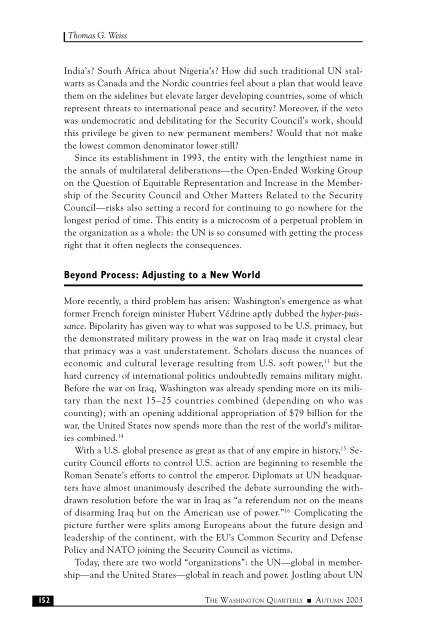The Illusion of UN Security Council Reform - United Nations ...
The Illusion of UN Security Council Reform - United Nations ...
The Illusion of UN Security Council Reform - United Nations ...
Create successful ePaper yourself
Turn your PDF publications into a flip-book with our unique Google optimized e-Paper software.
152<br />
l Thomas G. Weiss<br />
India’s? South Africa about Nigeria’s? How did such traditional <strong>UN</strong> stalwarts<br />
as Canada and the Nordic countries feel about a plan that would leave<br />
them on the sidelines but elevate larger developing countries, some <strong>of</strong> which<br />
represent threats to international peace and security? Moreover, if the veto<br />
was undemocratic and debilitating for the <strong>Security</strong> <strong>Council</strong>’s work, should<br />
this privilege be given to new permanent members? Would that not make<br />
the lowest common denominator lower still?<br />
Since its establishment in 1993, the entity with the lengthiest name in<br />
the annals <strong>of</strong> multilateral deliberations—the Open-Ended Working Group<br />
on the Question <strong>of</strong> Equitable Representation and Increase in the Membership<br />
<strong>of</strong> the <strong>Security</strong> <strong>Council</strong> and Other Matters Related to the <strong>Security</strong><br />
<strong>Council</strong>—risks also setting a record for continuing to go nowhere for the<br />
longest period <strong>of</strong> time. This entity is a microcosm <strong>of</strong> a perpetual problem in<br />
the organization as a whole: the <strong>UN</strong> is so consumed with getting the process<br />
right that it <strong>of</strong>ten neglects the consequences.<br />
Beyond Process: Adjusting to a New World<br />
More recently, a third problem has arisen: Washington’s emergence as what<br />
former French foreign minister Hubert Védrine aptly dubbed the hyper-puissance.<br />
Bipolarity has given way to what was supposed to be U.S. primacy, but<br />
the demonstrated military prowess in the war on Iraq made it crystal clear<br />
that primacy was a vast understatement. Scholars discuss the nuances <strong>of</strong><br />
economic and cultural leverage resulting from U.S. s<strong>of</strong>t power, 13 but the<br />
hard currency <strong>of</strong> international politics undoubtedly remains military might.<br />
Before the war on Iraq, Washington was already spending more on its military<br />
than the next 15–25 countries combined (depending on who was<br />
counting); with an opening additional appropriation <strong>of</strong> $79 billion for the<br />
war, the <strong>United</strong> States now spends more than the rest <strong>of</strong> the world’s militaries<br />
combined. 14<br />
With a U.S. global presence as great as that <strong>of</strong> any empire in history, 15 <strong>Security</strong><br />
<strong>Council</strong> efforts to control U.S. action are beginning to resemble the<br />
Roman Senate’s efforts to control the emperor. Diplomats at <strong>UN</strong> headquarters<br />
have almost unanimously described the debate surrounding the withdrawn<br />
resolution before the war in Iraq as “a referendum not on the means<br />
<strong>of</strong> disarming Iraq but on the American use <strong>of</strong> power.” 16 Complicating the<br />
picture further were splits among Europeans about the future design and<br />
leadership <strong>of</strong> the continent, with the EU’s Common <strong>Security</strong> and Defense<br />
Policy and NATO joining the <strong>Security</strong> <strong>Council</strong> as victims.<br />
Today, there are two world “organizations”: the <strong>UN</strong>—global in membership—and<br />
the <strong>United</strong> States—global in reach and power. Jostling about <strong>UN</strong><br />
THE WASHINGTON QUARTERLY ■ AUTUMN 2003


